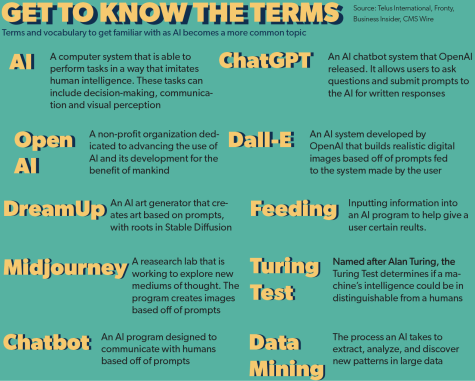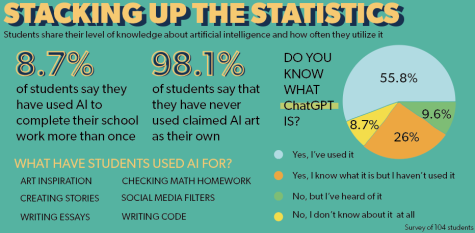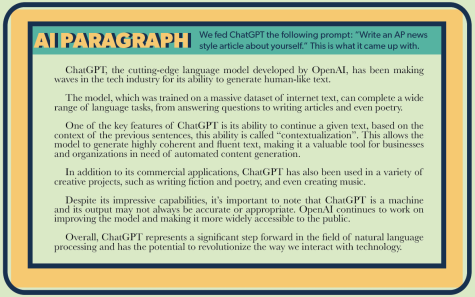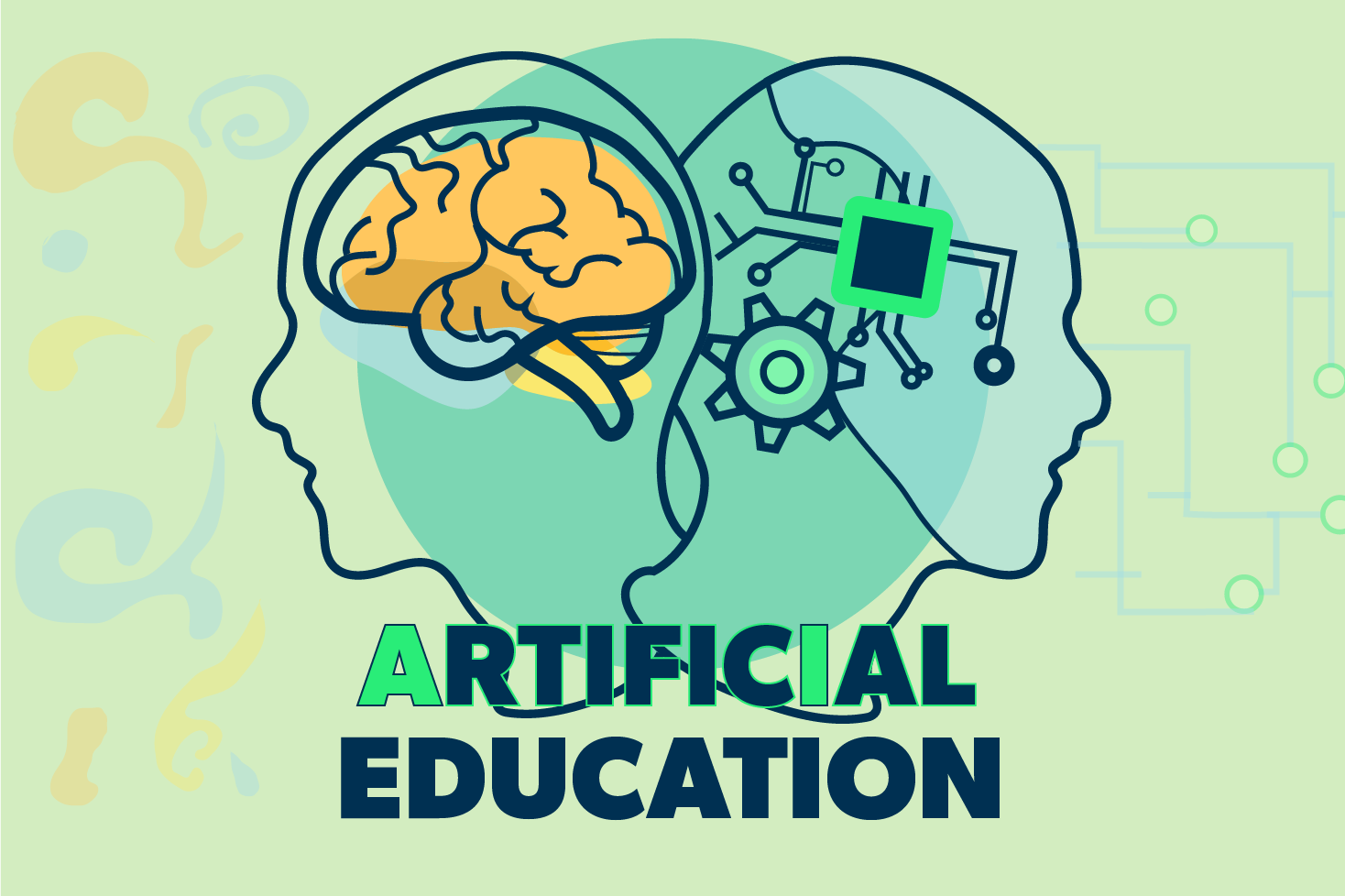The rise of Artificial Intelligence opens up a world of opportunities and risks
AI can be a useful tool, but some warn of the long term impacts.
February 10, 2023
AI, short for Artificial Intelligence, seems to have taken the educational world by surprise lately. One program that has gained traction in the past few months is ChatGPT, a chatbot program developed by non-profit research organization OpenAI. It is designed so users can interact conversationally with the bot and ask it questions. However, it has also been used by some students to write papers and complete other classwork. Technology meant to mimic human intelligence can be a daunting thought.
With some more understanding, however, it can be less scary. While AI certainly can be used for academic fraud, it can also be used to benefit users and help them learn new concepts. Various students and staff help debrief AI and how it may affect education going forward.
The Pros of AI

In education, artificial intelligence has the ability to open closed doors for students and create a more equitable experience, as it can be used to explain concepts or gain inspiration.
Physics teacher Ryan Johnston believes that students can utilize AI, in specific instances, on their school work. His vision is utilizing AI as a tool which can help explain specific problems or concepts they are having trouble with.
“I’m sure like any extremely powerful tool, we could use it positively,” Johnston said. “I mean, if you’re genuinely stuck and you’ve thought about the problem for a long time … it can help you over the edge.”
The increase of widespread internet access allows students to take advantage of more information through YouTube and similar platforms to explain various content. AI is able to serve the same purpose, but in a way that targets potential weak points within its users’ content understanding, according to Johnston. He sees this concept being used is for programming classes.
“If you have a programming problem, you can pick, copy and paste your code there and it will tell you, how you know where the error is, how to solve it, why it’s an error in the first place.” Johnston said. “That’s extremely useful, especially if you’re a beginner programmer, and you’re still trying to learn the ropes.”
The benefits of AI are not exclusive to education or students’ pursuits within STEM. It can also be used as a starting point for more creative tasks. Graphic design teacher Travis Kohler explains how AI art generators, like DALL-E or Midjourney, can be used to give artists a head start of inspiration on the way to creating their own, unique works.
“[AI is] a tool to be used to help create images that should help you make other stuff,” Kohler said. “… It’s the same as if I go to Google and I’m like, ‘How do I draw a dog?’ I need to go look at images of dogs, right?’ I can use that as inspiration but I’m not copying that image for my final product.”
While AI programs can be used similarly to Google in order to gain inspiration for artwork, the ability to put in specific prompts can help speed up the process. To Kohler, this can make AI-generated art simultaneously more impressive and daunting.
“It’s pretty impressive, the fact that you can put in a prompt [into an AI generator] and it comes out with this artwork,” Kohler said. “Obviously, some of the prompts become better than others and work better depending on how specific you are typing that stuff in. It’s pretty impressive and it’s kind of scary at times.”
With AI like ChatGPT being able to write entire essays at rapid speeds, the English department has especially been affected by this technology now available to the student population. Despite this, English teacher Madeline Byrd thinks that AI could be beneficial to educators if they look at the big picture first.
“I think it could have some great educational purposes.” Byrd said. “It’s so new though, right now we have to take a step back and look at in what ways is this going to benefit us and what ways can we use this?”
Cons of AI
As AI opens a door to a world of new possibilities, it also opens a world of risks. The speed at which AI technology can complete assignments that may otherwise take hours of original thought can be tempting. However, relying on technology to complete school work can negate the long-term benefits of a high school education.
Advancement is considered a good thing in almost any context, but from the perspective of a physics teacher, Johnston warns that without regulations, advancement in AI could cause unforeseen issues.
“Are there positive uses for AI? Of course, but AI run amok is a serious concern that probably isn’t taken seriously enough,” Johnston said.
Within the educational sphere, AI usage can result in plagiarism and other forms of academic fraud. While some AI generated texts may not be direct plagiarism, in its exact definition, is adamant that passing AI writing as your own is academic fraud.
“… if it’s not written by you, you are not the author, and you are saying those words are your own. That would be considered academic plagiarism,”Byrd said. “ You know, as long as it’s your words, it’s yours. If it’s not your words, it’s not and I think it can be as simple as that.”
Some students, like junior Olivia Peters, agree with Byrd’s sentiment, and are opposed to using AI complete assignments.
“I think [AI] is harmful to students,” Peters said. “It also throws off the way that people are able to complete academic work and I think it makes it a little unfair. I get there’s benefits to it and leveling a learning environment could be good, but mostly, it feels like cheating.”
With the technology being easily accessible, students might ask themselves: what could be so bad about using AI if they don’t get caught? An anonymous sophomore boy who used ChatGPT to complete a writing assignment explains how he utilized the program without anyone noticing.
“It was a short essay, only a few paragraphs,” the sophomore said. “I took the prompt from Canvas and tailored it a little bit so it made a little more sense to the AI. I put it in, then I went back through and read the provided sources and I put some quotes [into the AI]. I didn’t get caught I got an A on the assignment.”
According to teachers and students alike, there are long term, personal effects of using AI programs to complete work.

According to Byrd, when instructors assign work for a class, the goal of creating that assignment is improvement in a specific area, regardless of whether or not students may view it as busywork.
“The goal of school is that you are taking away something that you can use later,” Byrd said. “If you’re having something do your work for you, you’re not actively learning.”
Students with lots of homework and busy schedules may be tempted to turn to AI to complete simpler assignments. When an assignment is low-impact and doesn’t require much thought, the anonymous sophomore believes it can be easy to justify using AI.
“On [the assignment I used AI for], I was able to rationalize it very easily,” the sophomore said. “I would feel bad about doing it in a honors or AP class, or anything where I feel like it would actually be like, ‘Oh, I can learn from this.’ In that class, I was able to easily rationalize to myself, ‘Oh, it’s just this assignment.'”
Looking to the Future
With AI technology constantly improving, the opportunities and the obstacles it creates multiply in number for students and educators alike.
The possibilities of AI as a tool are numerous as its applicability to all fields of work expands with its development. Johnston highlights the benefits these expansions could have as a pathway to higher technological developments beyond the scope of human capabilities.
“Some problems … you’ll only be able to solve with AI,” Johnston said. “So having AI sort these things out will keep technology evolving – will keep the science evolving.”
According to Johnston, these technological advances hold a promising future for education that includes possibilities unthought of by even the most tech savvy individuals.
“In education, we’ve only just begun to tap into what this is,” Johnston said. “We’re just at the beginning of the AI revolution, really. I mean, ChatGPT is a new level of what we’re able to do.”
Byrd offers an alternative point of view, encouraging students to avoid using ChatGPT for schoolwork. Instead, she asserts that students should utilize other resources, such as teachers themselves, in order to develop answers individually.
“The goal is to ask questions. It’s for your own benefit,” Byrd said. “So ask questions. There are many other resources online where you can look up definitions to words. It’s just [about] not taking the easy way out.”
While the “easy way out” may be tempting for some students, the lessons taught in high school extend beyond just memorization, writing or math. The original thinking, reasoning and deduction skills associated with the ability to write and memorize are what’s at stake, according to Byrd.
“If people are only using it to cheat on papers, we’re probably going to see a lot of deficits in writing and being able to think critically and come up with reasons for [their] opinions,” Byrd said.
Similarly, Peters observes that using AI technology, especially for developing skills like writing, could cause a decrease in thinking and creative skills in her peers.
“If you’re writing for a class, generally the point of writing is to … use that skill because writing is used in almost every field you go into,” Peters said. “[Using AI] causes people to not gain those skills and not practice them, which I think is harmful for the student.”
Additionally, Peters argues that while there can be benefits to using AI, there is also a very real risk of its misuse as a shortcut for students, rather than as an inspirational starting point.
“I heard a lot…that people are trying to lean into these kinds of new technological developments as a form of growth,” Peters said. “I’m concerned that as AI develops and depending on how people use it, that’ll make it less used as a starting point and more used as an endpoint for people.”
Ultimately, Johnston explains that using AI to complete homework assignments could prevent students from learning the necessary life skills that normally come with graduating from high school.
“If you turn in every paper using AI…what do you really have when you graduate?” Johnston said. “You’ve got a piece of paper.”


leone • May 2, 2023 at 3:23 am
good article!